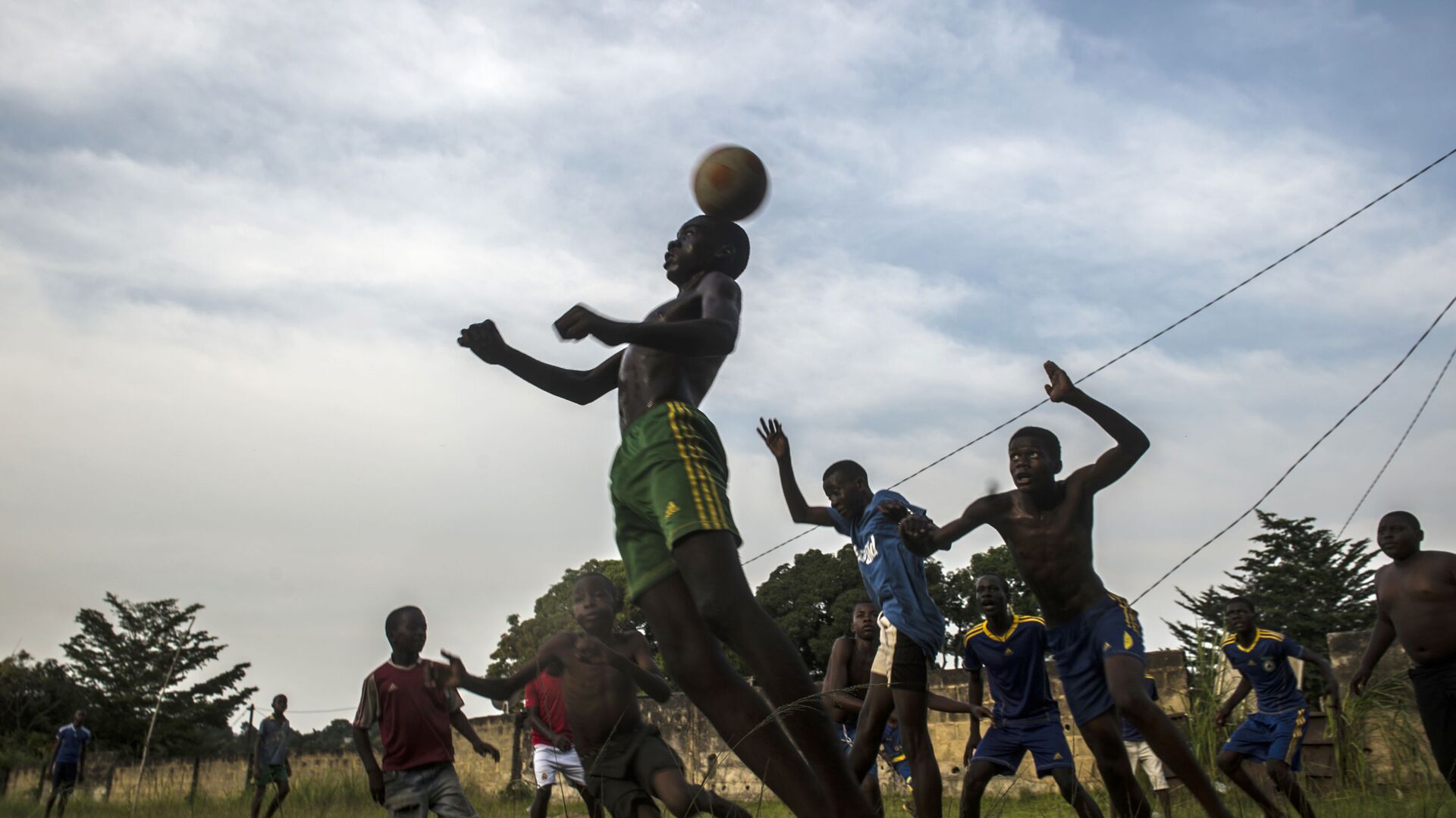https://sputnikglobe.com/20220817/from-franceville-to-francafrique-some-facts-about-gabons-independence-day-1099698340.html
From Franceville to ‘Francafrique’: Some Facts About Gabon’s Independence Day
From Franceville to ‘Francafrique’: Some Facts About Gabon’s Independence Day
Sputnik International
Gabon’s Independence Day is a public holiday on which most government offices, schools, and businesses are closed, allowing people to attend parades... 17.08.2022, Sputnik International
2022-08-17T13:38+0000
2022-08-17T13:38+0000
2022-11-23T11:37+0000
gabon
colonization
parliament
africa
independence day
france
west africa
https://cdn1.img.sputnikglobe.com/img/104980/10/1049801099_0:159:3076:1889_1920x0_80_0_0_ecbc3b84b7fd497d0e28d612292a849c.jpg
Wednesday marks the 62nd anniversary of Gabon’s independence from France. Here is a brief insight into how the colonization of the small central African nation took place before it turned into an independent republic.Portuguese Visit Gabon Despite the fact that Gabon proclaimed independence from France in 1960, in the 15th century it was the Portuguese who became the first European nation to colonialize what is now a country of about 2.2 million people.Gabon owes its name to the Portuguese, who did not think twice before dubbing the mouth of the country’s Komo River as “gabao”, which is Portuguese for "cloak", in an apparent nod to the shape of the estuary.French Colonists' Arrival Between the 16th and the 19th centuries, the central African nation was part of the so-called Loango Kingdom, which existed in the lands of what is now the western part of the Republic of the Congo, southern Gabon and the Angolan exclave of Cabinda.But what about France? Although French colonists came to the fore in Gabon in the late 1500s amid a growing slave trade in Africa, it was only at the end of the 19th century when they managed to successfully establish their presence in the country.At the time, French explorer Pierre Savorgnan de Brazza kicked off his first mission to the Gabon-Congo area and founded Franceville, currently the country’s third-largest city, among other things.After France officially occupied Gabon, the central African nation became one of four colonies of French Equatorial Africa at the beginning of the 20th century. These included the Central African Republic, Chad and the Republic of the Congo.Gabon Proclaims Independence During the republican government, also known as the Fourth French Republic, Gabon became a French overseas territory with its own assembly and representation in the French parliament. In 1958, the central African nation voted to become an autonomous republic within the French Community.Subsequent developments culminated on August 17, 1960, when Gabon gained its independence and became the Gabonese Republic joining the other three territories of the French Equatorial Union which also achieved their independence earlier that month.'Francafrique' SystemGabon, however, continued to maintain close relations with France, specifically promoting the use of French language and culture under a system known as "Francafrique", receiving both political and military support in exchange for commercial ties.Interestingly, Gabon has had just three presidents since it proclaimed independence in 1960. The late President Omar Bongo ruled for more than four decades, from 1967 until his death in 2009.
gabon
africa
france
west africa
Sputnik International
feedback@sputniknews.com
+74956456601
MIA „Rosiya Segodnya“
2022
Oleg Burunov
https://cdn1.img.sputnikglobe.com/img/07e4/09/0b/1080424846_0:0:2048:2048_100x100_80_0_0_3d7b461f8a98586fa3fe739930816aea.jpg
Oleg Burunov
https://cdn1.img.sputnikglobe.com/img/07e4/09/0b/1080424846_0:0:2048:2048_100x100_80_0_0_3d7b461f8a98586fa3fe739930816aea.jpg
News
en_EN
Sputnik International
feedback@sputniknews.com
+74956456601
MIA „Rosiya Segodnya“
Sputnik International
feedback@sputniknews.com
+74956456601
MIA „Rosiya Segodnya“
Oleg Burunov
https://cdn1.img.sputnikglobe.com/img/07e4/09/0b/1080424846_0:0:2048:2048_100x100_80_0_0_3d7b461f8a98586fa3fe739930816aea.jpg
gabon, colonization, parliament, independence day, france, west africa
gabon, colonization, parliament, independence day, france, west africa
From Franceville to ‘Francafrique’: Some Facts About Gabon’s Independence Day
13:38 GMT 17.08.2022 (Updated: 11:37 GMT 23.11.2022) Gabon’s Independence Day is a public holiday on which most government offices, schools, and businesses are closed, allowing people to attend parades, festivals, open-air concerts, and other entertainment events.
Wednesday marks the 62nd anniversary of Gabon’s independence from France. Here is a brief insight into how the colonization of the small central African nation took place before it turned into an independent republic.
Despite the fact that Gabon proclaimed independence from France in 1960, in the 15th century it was the Portuguese who became the first European nation to colonialize what is now a country of about 2.2 million people.
Gabon owes its name to the Portuguese, who did not think twice before dubbing the mouth of the country’s Komo River as “gabao”, which is Portuguese for "cloak", in an apparent nod to the shape of the estuary.
French Colonists' Arrival
Between the 16th and the 19th centuries, the central African nation was part of the so-called Loango Kingdom, which existed in the lands of what is now the western part of the Republic of the Congo, southern Gabon and the Angolan exclave of Cabinda.
But what about France? Although French colonists came to the fore in Gabon in the late 1500s amid a growing slave trade in Africa, it was only at the end of the 19th century when they managed to successfully establish their presence in the country.
At the time, French explorer Pierre Savorgnan de Brazza kicked off his first mission to the Gabon-Congo area and founded Franceville, currently the country’s third-largest city, among other things.
After France officially occupied Gabon, the central African nation became one of four colonies of French Equatorial Africa at the beginning of the 20th century. These included the Central African Republic, Chad and the Republic of the Congo.
Gabon Proclaims Independence
During the republican government, also known as the Fourth French Republic, Gabon became a French overseas territory with its own assembly and representation in the French parliament. In 1958, the central African nation voted to become an autonomous republic within the French Community.
Subsequent developments culminated on August 17, 1960, when Gabon gained its independence and became the Gabonese Republic joining the other three territories of the French Equatorial Union which also achieved their independence earlier that month.
Gabon, however, continued to maintain close relations with France, specifically promoting the use of French language and culture under a system known as "Francafrique", receiving both political and military support in exchange for commercial ties.
Interestingly, Gabon has had just three presidents since it proclaimed independence in 1960. The late President Omar Bongo ruled for more than four decades, from 1967 until his death in 2009.





